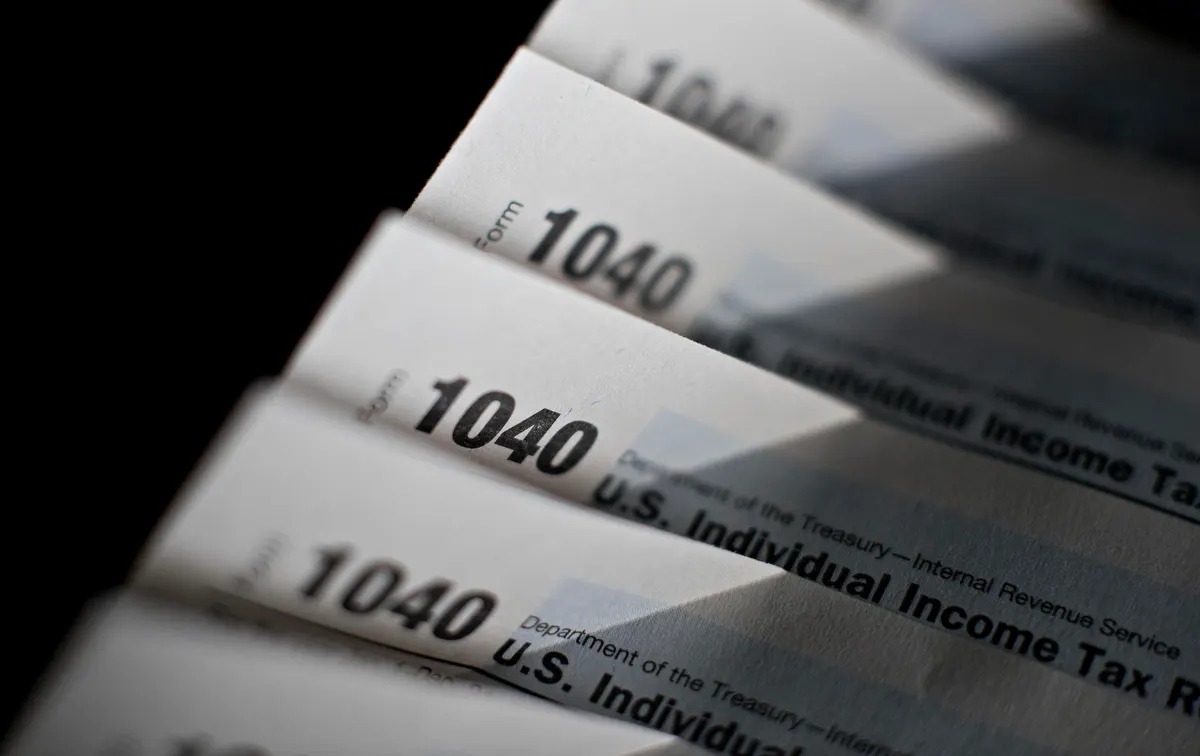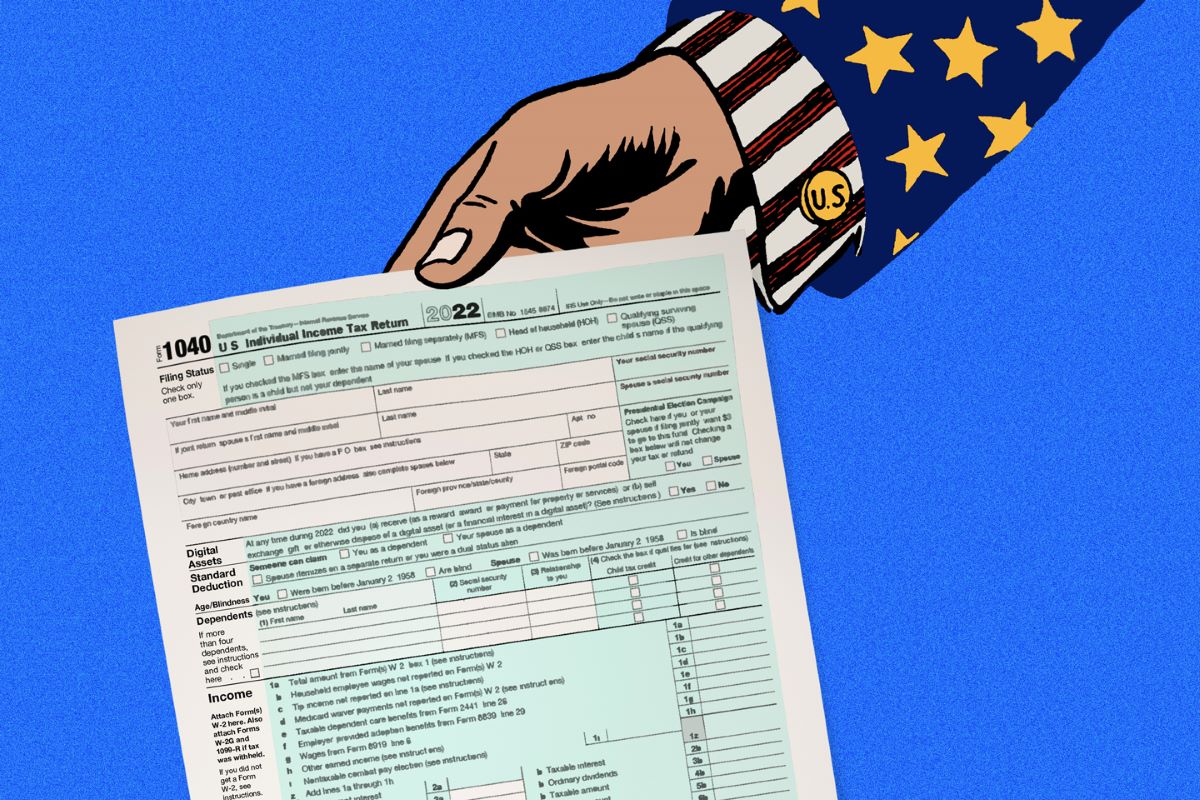

Finance
When Does Coinbase Report To The IRS?
Published: November 1, 2023
Learn about Coinbase's reporting requirements to the IRS and stay compliant with your finances. Find out when and how Coinbase reports to the IRS.
(Many of the links in this article redirect to a specific reviewed product. Your purchase of these products through affiliate links helps to generate commission for LiveWell, at no extra cost. Learn more)
Table of Contents
Introduction
Welcome to the world of cryptocurrency and taxes. As cryptocurrencies gain popularity and more people dive into the world of digital assets, it’s essential to understand the tax implications of trading and investing in cryptocurrencies. One platform that has become synonymous with cryptocurrency trading is Coinbase. With millions of users worldwide, Coinbase has played a significant role in the adoption of cryptocurrencies.
However, as with any financial activity, taxes are an integral part of the equation. The Internal Revenue Service (IRS) requires individuals to report their income, including gains from cryptocurrency investments. This has led many Coinbase users to wonder when and how Coinbase reports their trading activity to the IRS.
In this article, we will delve into the intricacies of Coinbase and IRS reporting. We will explore the reporting requirements for Coinbase, the criteria that trigger reporting, and the timeline for when Coinbase submits this information. Additionally, we will discuss the potential consequences of non-compliance and provide insights on how to ensure tax compliance.
So, if you’ve ever wondered about Coinbase and its relationship with the IRS, buckle up as we unravel the mysteries of when Coinbase reports to the IRS.
Understanding Coinbase and IRS Reporting
Before we dive into when Coinbase reports to the IRS, let’s first understand the role of Coinbase and the importance of IRS reporting.
Coinbase is a popular cryptocurrency exchange platform that allows users to buy, sell, and store various cryptocurrencies like Bitcoin, Ethereum, and Litecoin, among others. As a leading platform, Coinbase collects a vast amount of data related to users’ cryptocurrency transactions.
The IRS, on the other hand, is the United States’ tax authority responsible for ensuring taxpayers comply with their tax obligations. This includes the reporting of income from all sources, including cryptocurrency transactions.
The IRS considers cryptocurrencies as property, rather than traditional currency, which means that any gains from buying or selling cryptocurrencies are subject to taxation. Therefore, individuals are required to report their cryptocurrency gains or losses when filing their tax returns.
Since Coinbase plays a vital role in cryptocurrency trading, it becomes imperative for the IRS to receive accurate and comprehensive information about user transactions on the platform. Coinbase reporting to the IRS helps ensure that individuals are accurately reporting their cryptocurrency gains and complying with tax regulations.
By understanding how Coinbase and IRS reporting work, individuals can better navigate their cryptocurrency activities and ensure tax compliance. Now, let’s explore the specific reporting requirements for Coinbase users.
Coinbase Reporting Requirements
As a cryptocurrency exchange, Coinbase has reporting requirements imposed by the IRS. These requirements aim to provide the IRS with a comprehensive overview of users’ cryptocurrency transactions. Here are some of the key aspects of Coinbase reporting:
- Form 1099-K: Coinbase files a Form 1099-K for users who meet certain thresholds. If a user’s cryptocurrency transactions on Coinbase exceed $20,000 in value and involve at least 200 transactions in a calendar year, Coinbase is required to file a Form 1099-K with the IRS.
- Form 1099-MISC: Additionally, if a Coinbase user earns at least $600 in cryptocurrency rewards through programs like Coinbase Earn or Staking, Coinbase is also required to issue a Form 1099-MISC. These rewards are considered taxable income and must be reported on the user’s tax return.
- Transaction Records: Coinbase provides users with transaction records that can be used for tax reporting purposes. These records typically include details such as the date of the transaction, the type of cryptocurrency, the purchase or sale price, and any fees associated with the transaction. It is crucial for Coinbase users to maintain accurate records of their transactions to ensure proper reporting.
It is important to note that Coinbase reporting requirements may evolve or change over time. Therefore, it is essential for Coinbase users to stay updated on any changes in IRS regulations and Coinbase’s reporting policies.
Now that we understand the reporting requirements for Coinbase, let’s dive into the criteria that determine when Coinbase reports to the IRS.
Criteria for Reporting to the IRS
When it comes to reporting user transactions to the IRS, Coinbase follows specific criteria set by the IRS. These criteria determine when Coinbase is obligated to report user activity. Here are the key factors that trigger reporting to the IRS:
- Transaction Volume: Coinbase is required to report to the IRS if a user’s cryptocurrency transactions on the platform exceed certain thresholds. As mentioned earlier, if a user has more than $20,000 in transaction volume and at least 200 transactions in a calendar year, Coinbase is obligated to file a Form 1099-K with the IRS. It is important to note that this threshold applies to the combined value of all transactions on Coinbase, not just the gains.
- Earned Rewards: Coinbase is required to report earned rewards, such as cryptocurrency earned through Coinbase Earn or Staking programs, if the value reaches or exceeds $600 in a calendar year. These rewards are considered taxable income and must be reported on the user’s tax return.
- Other Factors: Coinbase may also report user activity to the IRS if they believe it is necessary to comply with legal or regulatory requirements.
It is crucial for Coinbase users to be aware of these criteria and monitor their transaction volume and earned rewards diligently. Failing to report taxable income or failing to meet reporting thresholds may result in penalties, interest, and potential legal consequences.
Now that we understand the criteria for reporting to the IRS, let’s explore the timeline for when Coinbase submits this information to the IRS.
Timeline for Coinbase Reporting
The timeline for when Coinbase reports user activity to the IRS is an important aspect to understand. While Coinbase is required to report user transactions based on specific criteria, it is equally important for users to know when this reporting takes place.
Typically, Coinbase reports user activity to the IRS in the form of applicable tax forms, such as Form 1099-K and Form 1099-MISC, by January 31st of the following calendar year. This means that if you meet the reporting thresholds on Coinbase during a particular tax year, you can expect to receive the corresponding tax forms from Coinbase by the end of January in the following year.
It is worth noting that the tax forms provided by Coinbase will include the necessary information required for users to accurately report their cryptocurrency gains, rewards, and other relevant details on their tax returns.
Therefore, it is crucial for Coinbase users to keep track of their transactions and maintain accurate records throughout the year. By doing so, users can ensure that they have the necessary information to report their cryptocurrency activity correctly when tax season arrives.
Furthermore, it’s important to remember that tax regulations and reporting requirements can change over time. It is advisable to stay informed about any updates or changes in IRS guidelines, as well as any updates from Coinbase regarding their reporting policies and procedures.
Now that we have covered the timeline for Coinbase reporting, let’s explore the potential consequences of non-compliance with tax obligations related to cryptocurrency trading.
Potential Consequences of Non-Compliance
Failure to comply with tax obligations related to cryptocurrency trading on Coinbase can have serious consequences. The IRS takes tax reporting and compliance seriously, and penalties can be imposed on individuals who fail to fulfill their responsibilities. Here are some potential consequences of non-compliance:
- Penalties and Interest: If you fail to report your cryptocurrency gains or earnings from Coinbase on your tax return, you may be subject to penalties and interest. The IRS can impose fines and charges based on the amount of unreported income. These penalties can quickly add up and result in significant financial consequences.
- Audits and Investigations: Non-compliance with tax obligations can increase the likelihood of an audit or investigation by the IRS. If your tax returns indicate discrepancies or inconsistencies, the IRS may choose to examine your financial records more closely. An audit can be time-consuming, stressful, and could result in additional penalties if irregularities are discovered.
- Legal Consequences: In extreme cases of deliberate tax evasion or fraud, non-compliance with tax obligations can lead to legal consequences. This can include criminal charges, fines, and even imprisonment.
It is essential to understand that the IRS has stepped up its efforts to enforce compliance in the cryptocurrency space. With the increasing use of digital currencies, the IRS is actively monitoring cryptocurrency activities and cracking down on individuals who evade their tax obligations.
Given the potential consequences of non-compliance, it is in your best interest to ensure that you report your cryptocurrency gains and earnings accurately when using Coinbase. By being proactive and responsible, you can avoid unnecessary penalties and legal troubles.
Now that we have explored the potential consequences of non-compliance, let’s discuss ways to ensure tax compliance when using Coinbase.
Ways to Ensure Tax Compliance
When it comes to tax compliance on Coinbase and other cryptocurrency platforms, here are some important steps you can take to ensure you meet your tax obligations:
- Educate Yourself: Take the time to educate yourself about the tax implications of trading and investing in cryptocurrencies. Understand how the IRS treats cryptocurrencies, what transactions are taxable, and how to report your gains properly.
- Maintain Accurate Records: Keep detailed records of your cryptocurrency transactions on Coinbase. This includes the date and type of transactions, purchase or sale amounts, and any fees associated with the transactions. Accurate records will help ensure that you report your gains correctly.
- Use Tax Software or Professional Help: Consider using tax software or consulting a tax professional to help calculate and report your cryptocurrency gains accurately. They can guide you through the complexities of cryptocurrency taxation and assist in ensuring compliance.
- Report All Income: Remember to report all your cryptocurrency gains, including those earned through Coinbase, on your tax return. This includes gains from trading, mining, staking, and any rewards earned through Coinbase programs.
- Stay Informed: Keep up to date with changes in IRS guidelines and reporting requirements. It is crucial to stay informed about any updates or changes that may affect your tax obligations as a Coinbase user.
- Seek Professional Advice: If you have complex cryptocurrency transactions or are unsure about how to handle your tax obligations, seeking professional advice from a tax attorney or accountant specializing in cryptocurrency taxation can provide you with personalized guidance.
By following these steps, you can better ensure tax compliance when using Coinbase. Remember, it’s essential to take the necessary precautions and fulfill your tax obligations to avoid penalties, audits, or legal consequences.
Now that we have explored ways to ensure tax compliance, let’s summarize the key points discussed in this article.
Conclusion
Navigating the world of cryptocurrency trading on platforms like Coinbase comes with its own set of responsibilities, including tax compliance. Understanding when and how Coinbase reports to the IRS is crucial for users to meet their tax obligations accurately.
In this article, we explored the role of Coinbase and the importance of IRS reporting in the context of cryptocurrency trading. We discussed the reporting requirements for Coinbase, including the filing of Form 1099-K and Form 1099-MISC for certain users. We also covered the criteria that trigger reporting, such as transaction volume and earned rewards.
We learned that Coinbase typically reports user activity to the IRS by January 31st of the following calendar year, through the issuance of relevant tax forms. It is important for Coinbase users to keep track of their transactions and maintain accurate records throughout the year to ensure proper reporting.
We also discussed the potential consequences of non-compliance with tax obligations, including penalties, audits, and legal consequences. To avoid these consequences, we highlighted several ways to ensure tax compliance, such as educating yourself, maintaining accurate records, using tax software or professional help, reporting all income, staying informed, and seeking professional advice if needed.
By following these steps and fulfilling your tax obligations, you can navigate the world of cryptocurrency trading on Coinbase with peace of mind, knowing that you are compliant with IRS regulations. Remember, tax laws and reporting requirements may change over time, so it’s important to stay informed and adapt accordingly.
As the cryptocurrency landscape continues to evolve, staying on top of your tax obligations ensures that you can enjoy the benefits of the digital currency revolution while maintaining your financial and legal responsibilities.













